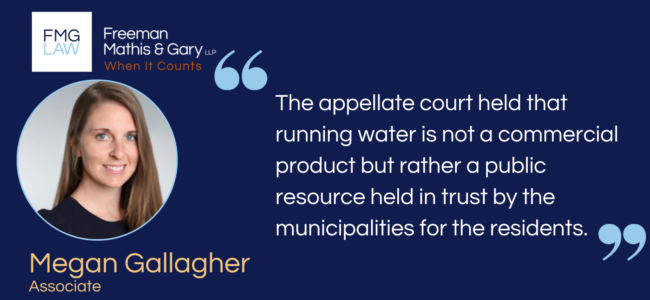BlogLine
In New Jersey, Tort Claims Act shields municipalities from implied duty to provide clean water
10/7/24

In combining appeals on two lower court cases, a recent New Jersey appellate decision in Cerkez, individually and on behalf of all other similarly situated, v. Gloucester City, et al., Docket No. A-0661023; A-0745-23, Superior Court of New Jersey, Appellate Division (2024), has found that consumers may not sue New Jersey municipalities for issuing contaminated metered public water under implied contractual theories. The court was tasked with determining the impact of the N.J.S.A. 59:1-1, et seq., New Jersey Torts Claims Act (“TCA”), which limits the causes of action that can be brought by an individual against a government entity, in deciding whether the relationship between municipal water distributors and residents is governed by tort or contract principles.
In the underlying claims, two different residents filed lawsuits asserting breach of contract theories, rather than strict liability theories, against two different New Jersey municipalities, arguing the municipalities’ distribution of metered water to residents created an implied contractual relationship and should allow residents the opportunity to sue. Each lower court reached a different decision.
In the first case, filed against Gloucester City, the Department of Environmental Protection issued a one-year deadline for the city to lower PFNA levels in the water supply, which the city failed to meet. Residents were advised that drinking water with elevated PFNA levels over many years could result in liver, kidney, and immune system problems. Those with compromised immune systems, infants, or individuals who were pregnant could be at increased risk. A city resident filed suit asserting that the water sold to him by the township continued to be contaminated in violation of the covenant of good faith and fair dealing, and also alleged promissory estoppel. The resident sought economic damages for the placement of filtration systems and asked the court to compel Gloucester City to provide uncontaminated water. Gloucester City succeeded on a motion for summary judgment. The lower court ruled that water was held in public trust, and supplying it was a government service rather than a proprietary relationship.
In the second case, filed against the Borough of Brooklawn, a resident filed suit when the township’s PFNA levels exceeded the Department of Environmental Protection’s threshold. Brooklawn, rather than treat the contaminated water, mixed the contaminated water with non-contaminated water to dilute PFNA levels. In this case, the resident also claimed a violation of good faith and fair dealing, promissory estoppel, and breach of contract. Brooklawn filed a motion to dismiss, which was denied by the lower court.
Both cases were combined on appeal. Notably, neither resident chose to proceed under a tort theory, stating they were not seeking personal injury claims. They argued that the municipalities continued to sell contaminated water with knowledge of its contamination. In response, the municipalities relied on The Restatement (Second) of Torts § 402A (Am. Law. Inst. 1965), which states that an individual “who sells any product in a defective condition unreasonably dangerous to the user or consumer . . . is subject to [strict] liability for physical harm” but under the TCA, no strict liability or implied warranty claims are permitted against governmental entities. Defendants, therefore, argued that because the claims were alleging the selling of defective and/or dangerous water, the claims were barred by the TCA. Defendant Brooklawn argued the TCA eliminated the distinction between governmental and proprietary activities and Plaintiff cannot “recast his claims as a contract dispute to defeat application of the TCA.” Brooklawn further argued that the resident claims violated the TCA’s foundational goal to avoid excessive burdens on taxpayers.
The appellate court held that running water is not a commercial product but rather a public resource held in trust by the municipalities for the residents. As such, the municipalities are performing a governmental service, which is not equivalent to a company providing water for profit. The appellate court ruled in favor of the municipalities, finding that while carefully crafted as a contract dispute by the residents, the claims were masked implied warranty claims and barred under the TCA.
As it relates to tort actions, this will be an issue to watch going forward, as absent express contracts with residents, townships in New Jersey are seemingly not subject to liability by residents for issuing contaminated water unless and until residents can show personal injury, including potential long-term health effects.
Please contact Megan C. Gallagher at megan.gallagher@fmglaw.com or your local FMG relationship partner to learn more.
Share
Save Print
